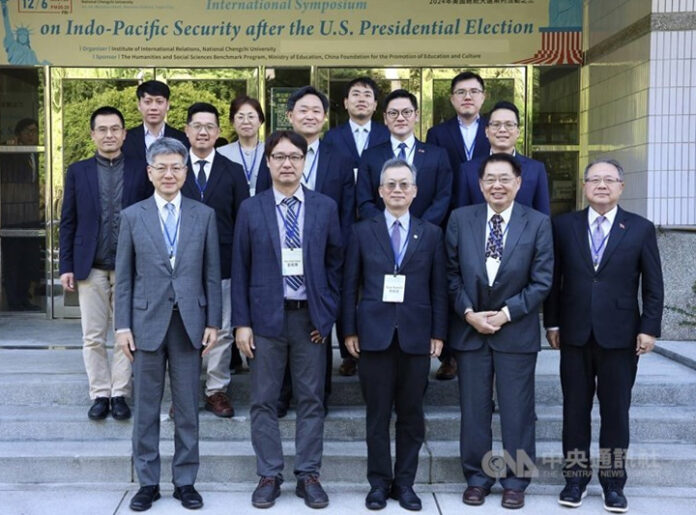Experts Predict China Won’t Invade Taiwan Under Trump’s 2nd Term
As former U.S. President Donald Trump prepares to begin his second term in office in early 2025, experts from Taiwan and abroad have weighed in on the geopolitical ramifications, particularly concerning China’s stance on Taiwan. According to Taiwanese and foreign scholars, Chinese President Xi Jinping is unlikely to initiate a military invasion of Taiwan during Trump’s second term.
At a recent symposium held by the Institute of International Relations at National Chengchi University in Taipei, scholars discussed the possible impact of Trump’s return to the White House on Taiwan-China relations. They emphasized that while Xi Jinping’s ambitions for global dominance have grown over the years, he is not expected to pursue military aggression in the near future.
Xi Jinping’s Focus: Power Retention Over Taiwan Unification
Akio Takahara, a distinguished professor at Tokyo Woman’s Christian University and a renowned expert on Chinese politics, noted that Xi’s primary concern is to maintain his hold on power, not unification with Taiwan. Takahara explained that while Xi sees the unification of Taiwan as essential for China’s nationalistic goals, it is unlikely that he will prioritize military action in the immediate future.
“Xi’s ambition to establish China as a global superpower has intensified, but attacking Taiwan now would be too risky,” Takahara said, adding that such an invasion could seriously damage China’s economy and undermine Xi’s political legitimacy.
He further predicted that Xi would continue his strategy of “winning without fighting,” which focuses on economic and cultural influence in Taiwan rather than military action. However, Takahara acknowledged that if Xi finds it necessary to attack Taiwan to secure his political survival, he may eventually resort to force. But this is unlikely to happen in the next few years, he emphasized.
Taiwan’s Security Amidst Changing U.S. Policy
The symposium also included insights from Dennis Weng, an associate professor at Sam Houston State University. Weng echoed Takahara’s views, predicting that during Trump’s second term, military conflict between Taiwan and China is unlikely. Trump, known for his non-interventionist stance, will likely employ diplomatic means to prevent escalation.
“Trump will likely use bargaining and negotiation to avoid military confrontation with China,” Weng said, underlining that Trump’s approach will prioritize dialogue over direct military action.
Despite the reduced likelihood of military action, both experts acknowledged that China could still use other forms of political pressure on Taiwan. This includes cutting trade ties and further isolating Taiwan diplomatically by convincing remaining countries to sever formal relations.
U.S. Response to Potential Chinese Aggression
Weng’s research also explored U.S. and Taiwanese elite views on the possibility of military intervention. According to his study, only a small percentage of Chinese elites (10%) believed the U.S. would intervene militarily if China were to invade Taiwan. Meanwhile, a slightly higher number of Taiwanese (20.5%) and American elites (14.3%) shared the belief that the U.S. would come to Taiwan’s defense.
A 2024 survey by the Chicago Council on Global Affairs found that 36% of Americans support military intervention to defend Taiwan in the event of an invasion. However, Weng emphasized that under Trump’s leadership, U.S.-Taiwan policy will likely be influenced by elite-driven decisions, meaning Taiwan should focus on strengthening its relations with American political elites.
Table: Key Predictions on Taiwan-China Relations Under Trump’s 2nd Term
| Expert | Prediction | Reasoning |
|---|---|---|
| Akio Takahara | No immediate military invasion by China | Xi prioritizes power retention over Taiwan unification. |
| Dennis Weng | Diplomacy over military conflict | Trump’s non-interventionist stance will avoid military escalation. |
| U.S. Elite Opinion | 14.3% believe U.S. will intervene in Taiwan’s defense | Based on a 2024 Chicago survey and interviews with experts. |
| Taiwan Elite Opinion | 20.5% believe U.S. will intervene in Taiwan’s defense | Differing views between Taiwan’s government elites and public perception. |
Frequently Asked Questions (FAQ)
Q1: Will China invade Taiwan during Trump’s second term?
A: Experts predict that China is unlikely to launch a military invasion of Taiwan during Trump’s second term due to the risks involved, including economic repercussions and the need for Xi to maintain his power.
Q2: What is Xi Jinping’s main focus regarding Taiwan?
A: While Xi Jinping sees Taiwan as an essential goal for China’s national unity, his top priority remains consolidating and retaining power rather than pursuing immediate military action.
Q3: How will Trump handle Taiwan-China relations in his second term?
A: Trump is expected to employ diplomatic means to avoid military conflict, utilizing negotiations and political bargaining to prevent a war with China over Taiwan.
Q4: What forms of pressure might China use on Taiwan if not military action?
A: China could resort to economic measures such as cutting trade ties with Taiwan, as well as increasing Taiwan’s diplomatic isolation by pressuring countries to sever ties with Taipei.
Q5: What is the likelihood of U.S. intervention in Taiwan’s defense?
A: While some elites in the U.S. and Taiwan believe that the U.S. would intervene in Taiwan’s defense, it is less certain under Trump, as his foreign policy is expected to be more elite-driven and non-interventionist.
